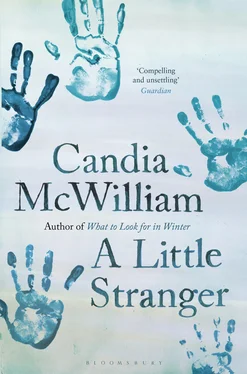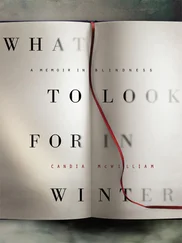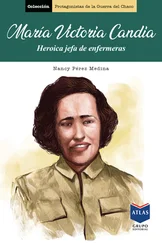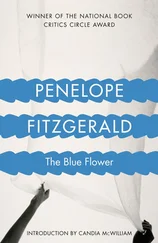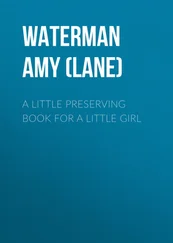Candia McWilliam - A Little Stranger
Здесь есть возможность читать онлайн «Candia McWilliam - A Little Stranger» весь текст электронной книги совершенно бесплатно (целиком полную версию без сокращений). В некоторых случаях можно слушать аудио, скачать через торрент в формате fb2 и присутствует краткое содержание. Год выпуска: 2011, Издательство: Bloomsbury UK, Жанр: Современная проза, на английском языке. Описание произведения, (предисловие) а так же отзывы посетителей доступны на портале библиотеки ЛибКат.
- Название:A Little Stranger
- Автор:
- Издательство:Bloomsbury UK
- Жанр:
- Год:2011
- ISBN:нет данных
- Рейтинг книги:3 / 5. Голосов: 1
-
Избранное:Добавить в избранное
- Отзывы:
-
Ваша оценка:
- 60
- 1
- 2
- 3
- 4
- 5
A Little Stranger: краткое содержание, описание и аннотация
Предлагаем к чтению аннотацию, описание, краткое содержание или предисловие (зависит от того, что написал сам автор книги «A Little Stranger»). Если вы не нашли необходимую информацию о книге — напишите в комментариях, мы постараемся отыскать её.
A Little Stranger — читать онлайн бесплатно полную книгу (весь текст) целиком
Ниже представлен текст книги, разбитый по страницам. Система сохранения места последней прочитанной страницы, позволяет с удобством читать онлайн бесплатно книгу «A Little Stranger», без необходимости каждый раз заново искать на чём Вы остановились. Поставьте закладку, и сможете в любой момент перейти на страницу, на которой закончили чтение.
Интервал:
Закладка:
‘Well done, you had a nice sleep,’ she said. Hurt, I was a child, and she spoke to me as though I were her charge. I was still feeling for the thing I must say to her. I was sore, but I did not want to burden her with that. I knew there was some reason I should be tactful to her. I lay for a time and did not sleep, watching her, slight and poised, in my old nursing chair. She was so small its truncated legs did not make her awkward on its low seat.
The room had been emulsioned before the war, the yellow of coltsfoot. Chafed in places, the old paint sucked in light as chalk does water. The ceiling’s rose was a plain wreath of white apples upon white boughs. Dropping white muslin in a tent over our bed, crossed double axes of gilded pear wood surmounted the four pillars between which I sprawled.
Margaret, on the low chair, its cambric cover tied like a pinafore behind, fitted in, as she had since the first day. She put her book to the floor; it had no spine to snap as she splayed it.
‘You fit in so well, Margaret,’ I said. I was reluctant to nick the silence. ‘Is that John I hear?’ I heard nothing, in fact, but I wanted, without appearing to question her care, to know where he was. I wondered how his first lunch had been.
‘I gave him to Lizzie for the afternoon. There are some betimes chicks in the partridge pens and Robert says they feed well from children.’ She was using Robert’s country phrases easily.
She thought of everything. But whose was he to ‘give’? When had she done this? Before or after my fall?
‘Did you meet the other nannies?’ I asked. I was surprised by how it hurt to talk.
I knew the look she gave me, but not from her face. I remembered it from the face of my father when he tried to make my mother’s total disappearance another nursery absence, as though she had just gone to fetch a pail of water or to pull out a plum.
‘Aren’t you getting on with Jackie and Sue and the others?’
The pain made me careless of the courtesies.
‘Oh they’re fine. It’s not up to me.’ I knew that the best friendships shifted now and again, changing with weight lost or admirers gained.
There must have been some teasing over the loveshot keeper. But could that be enough to cause the severance? I remembered the poor girl was pregnant. Nannies must be able to tell immediately. Look at Margaret, with me. After all, they worked with the animals. A pregnant nanny. She was condemning herself to invisibility.
‘Is there something you would like to tell me?’ I seemed recently to have asked the same question.
‘No. I couldn’t. I couldn’t.’ She twisted her wristwatch and rotated the pearls at her earlobes. Dated, womanly signs of distress, learnt no doubt from mother and from screen.
‘Is it something about yourself?’
‘I can’t say.’
‘I think I can guess. Do you want me to say?’
‘Oh, no.’ It was as though I might spoil something. Already the progressive slow waltz of mother and foetus had begun between Margaret and the child she carried. She did not want me to make her lose the beat.
‘Margaret, are you in trouble?’ I do not know where the phrase came from.
‘No. It’s you.’ Well, I knew that. She and the handsome doctor must both think me very dumb.
‘Try talking to me, Margaret. Try, love.’ My back was burning, slowly, like lit gun cotton soaked in spirit. My skin was smoking to crackling with the heat of the pain.
‘I’d rather not, if you don’t mind. It isn’t nice.’ Her eyes filled with tears. So, she had got a child, but had not enjoyed the getting. Was it Robert’s? Was it the child of Ronald who was neither Scots nor Irish?
‘Is it something I could help with?’ After all, she had said, ‘It’s you.’ What did she mean? Did she feel trapped in our rich life, was there something we had not done?
‘It’s quite natural, you know,’ I said, exhausted with diplomacy and pain.
‘They think so.’
‘They?’
‘The other nannies.’ She might as well have said ‘navvies’. I heard the contempt in her voice.
‘Weren’t you planning a night out soon? A birthday? Dawn’s? I seem to remember something of the sort.’
‘I’ve had to tell them I can’t go.’
Could there really be no comradeship among women? I was sure the father’s friends must be drawing shoulder to shoulder, buying him drinks, congratulating and commiserating. Like eels or alligators, women move over each other, ruthless and unimpressionable, rushing for the warm seas of mating and rearing.
‘Don’t let yourself be hurt by what other people say,’ I said.
Again she said, ‘It’s you.’
I was losing patience.
‘You’ll have to explain. I’m lost.’ The pain in my back reached round and keelhauled me. I was drawing out Margaret, and my guts were being drawn out of me.
‘It’s what the other nannies say.’
‘About me? Come on, sticks and stones.’
That was a bit prissy of her, really, if loyal. Surely they all discussed us at scurrilous length? Why should she object? We took on their attention in remunerating their labour.
‘Not you, as such.’
I was now in real pain. I knew it from somewhere, though it seemed fresh. In the air I smelled the bubble of blood you smell before a big fight. My forehead was cold with sweat. Something I could not prevent was expelling myself from me. I began to breathe very carefully as though I were hiding from someone who sought my life, behind only the thinnest of curtains. This pain had a familiar face, but its expression was twisted. I did not want brutally to ask her how pregnant she was. I did not care to hurt or scare her.
‘Have you rung the doctor?’ I asked. I knew he had something to do with all this.
She regarded me swiftly and said, ‘No.’
Then, as though in alarm, she continued speaking, maybe to ensure my silence. She appeared terrified at the mention of the doctor. She smelt, suddenly, of acetone. The sockets of her arms were circled with sour cloth. Her lips showed white gums.
I knew then that I was struggling for the life of my child.
‘I can’t see those nannies any more. They say it’s your doing he loves me. He loves me. And so does the child you call your son. He loves me .’
There being no doubt who he was, I felt with no shock the waters break from me into his bed.
Chapter 26
I said that I had love to spare. That happens when you have a child. There must always be more. Not more of everything, but more of love. You never know when it may be needed.
It was easy to love my beautiful son. I had not found it easy to love Margaret. I did not even like her. I romanticised her because I wanted a quiet life. I thought I did like her because I needed her services. Doing this, I put my child in the care of a scheming fantasist. Most galling, it is the smallest things, and the things which make me despise myself the most, which I mind worst, to this day. I did, while of sound mind and with no particular job to do, allow my son to be defused, disconnected from what is important, alive and funny. I allowed him to be taught not only the natural sins of his fathers, but those sins glorified by their victims. Margaret believed in granite-jawed potentates; men who were men were the men for her. Not as they were, but all cleaned up. Nannied. Lightly castrated, like princes in the ballet.
Poor Margaret. She would have been scandalised if she’d known of wet-nurses. Bottles only, please, and not of gin. No jugs, no dugs.
Why did she care for children? Why work with the animals? I still wonder, and can only think that it was the opportunity to participate in the books she’d read and the films she’d seen. These are the books read and the films seen by most young women, but very few have decided to become a pearl. And Margaret was a pearl, of very great price.
Читать дальшеИнтервал:
Закладка:
Похожие книги на «A Little Stranger»
Представляем Вашему вниманию похожие книги на «A Little Stranger» списком для выбора. Мы отобрали схожую по названию и смыслу литературу в надежде предоставить читателям больше вариантов отыскать новые, интересные, ещё непрочитанные произведения.
Обсуждение, отзывы о книге «A Little Stranger» и просто собственные мнения читателей. Оставьте ваши комментарии, напишите, что Вы думаете о произведении, его смысле или главных героях. Укажите что конкретно понравилось, а что нет, и почему Вы так считаете.
